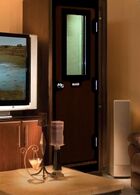Soapbox in a Soundproof Room
The Soapbox in a Soundproof Room is a collaborative invention between polite ranters and annoyed listeners. The polite ranters were concerned that their restrained diatribes may have a grating effect on people within earshot, and so they wanted to go to a solitary place. The annoyed listeners just wished that those ranters, polite or not, would go to a place where they couldn't be heard. A flash of inspiration later, the Soapbox in a Soundproof Room was invented.
Inspiration[edit]
Paul Eitranter was on his soapbox on a soapbox in a tank on a soapbox on March 3, 2003 voicing his opinions on the whereabouts of Weapons of Mass Destruction, carefully controlling the volume of his voice in order to not offend passersby uninterested in his improvised rhetoric.
However, one such passerby, Arnold Lessener, after four previous Cicero-shamers had questioned his viewpoints and beliefs, demanded to Eitranter "Could you go somewhere else?". Eitranter felt slightly guilty that his rant had fallen upon unwilling ears. He asked in return, "Where did you have in mind?" Taken aback at the civil manner this Cato-clone responded to his demand, Lessener said "Well, um. Preferably somewhere I couldn't hear you." A light bulb turned on in Eitranter's head, despite his background in acoustics. He proposed, "Like a soundproof room." Lessener enthusiastically agreed.
The two quickly drew up plans for soapboxes in a soundproof rooms and patented the idea. They refused to be dismayed at the patent office clerk's insulting statement that they couldn't patent a piece of crap idea like putting a soapbox in a soundproof room. They dreamed of a franchise: Soapboxes, in Soundproof Rooms; and quickly put their dreams into actions.
Popularity[edit]
The first Soapboxes in Soundproof Rooms turned up on street corners of populated cities, like Chicago, New York, and Washington. They proved to be very popular and the city councils enacted laws to put "Soapboxers", as they had come to be known, into the soundproof rooms. Critics of these laws, mostly the Soapboxers themselves, voiced their frustrations on the street, but as the Demosthenes-dilettantes could not be heard, they were promptly ignored.
Eitranter and Lessener, now independently wealthy as the demand for soundproofed soapboxes rose and rose, discussed their family lives. Both men spoke to each other about their sons, daughters, wives, and mothers, and how they all complained and whined far too much. A light bulb turned on in Lessener's head, despite his background in family counseling. He spoke only two words that Eitranter instantly understood: Home Edition.
The Soapboxes in Soundproof Rooms: Home Editions turned out to be even more popular than the regular edition. Now, family members no longer had to listen to other family members rant about how they stayed out too late last night, how they don't love them, how they don't understand them, how they think they should see other people. Instead, family members can relax, drink some lemonade, maybe read a magazine or two, while the offending member vents his or her frustration in a soundproof environment.
Decline[edit]
Soapboxes in Soundproof Rooms turned out to be a short-lived fad, as an even more silent and even more ignorable form of voicing frustration appeared: the blog. The blog presented Seneca-simulators the opportunity to create inflammatory rhetoric without the need for skills in oratory and from the comfort of their own homes.
Eitranter and Lessener attempted to revitalize the market for soapboxes in soundproof rooms with the Office Edition. The new edition failed to meet sales expectations, with potential customers noting that the functionally identical Home Edition was cheaper, and that employees could already expertly tune out their ranting bosses.
The Home Edition remains popular, as the need to escape family conflicts is ever present. Many customers proudly note that the Home Edition has made their Thanksgivings and Christmases the idyllic family gatherings they were always meant to be.

